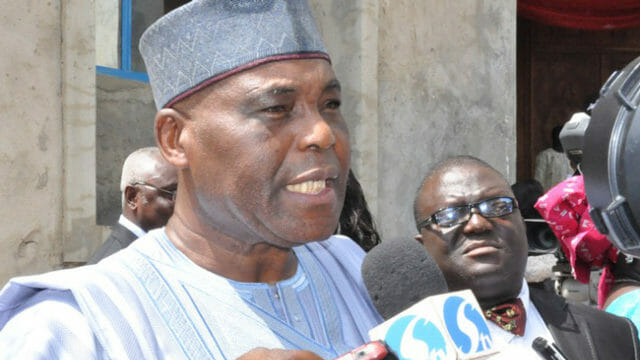The Chief Judge of the Federal High Court, Abuja, Justice John Tsoho, on Tuesday issued an order unfreezing the N2.1 billion bank account of the founder of Daar Communications Plc, Chief Raymond Dokpesi.
Justice Tsoho ordered that the account domiciled at First Bank of Nigeria be immediately unfreezed since the criminal charges, which precipitated the restriction on the account had been dismissed and Dokpesi discharged and acquitted by the Court of Appeal.
Delivering ruling in an application filed and argued by Kanu Agabi SAN, on behalf of Dokpesi, Justice Tsoho said that the Federal Government has no basis to put a post-no-debit order on the account in view of the subsisting and valid order of the Court of Appeal.
Justice Tsoho delivered judgment after taking arguments from Dokpesi’s lawyer, Kanu Agabi, SAN and counsel to the Economic and Financial Crimes Commission (EFCC), Oluwaleke Atolagbe.
The Chief Judge held that since the Court of Appeal delivered the judgment that invalidated the criminal charges against Dokpesi, the EFCC had not applied for stay of execution of the judgment.
Justice Tsoho said that in the absence of a stay of execution, his court was bound by law to give effect and implementation to the judgment.
He thereafter ordered that the freeze order and post-no-debit on the account be immediately removed in compliance with the appellate court’s decision.
On the claim of EFCC that it has gone on appeal to the Supreme Court, Justice Tsoho held that the notice of appeal filed at the apex court cannot in law stay the execution of the subsisting judgment adding that the anti graft agency ought to have obtained a stay of execution of the judgment.
He also ordered that all documents seized from Dokpesi or voluntarily surrendered to the Federal Government be immediately returned to him.
Atolagbe, in a bid to convince the judge, had drawn the attention of the court that the Department of State Services, DSS, and National Intelligence Agency, NIA, made respondents in the matter, did not appear before the court and as such the court can not make valid order against them.
